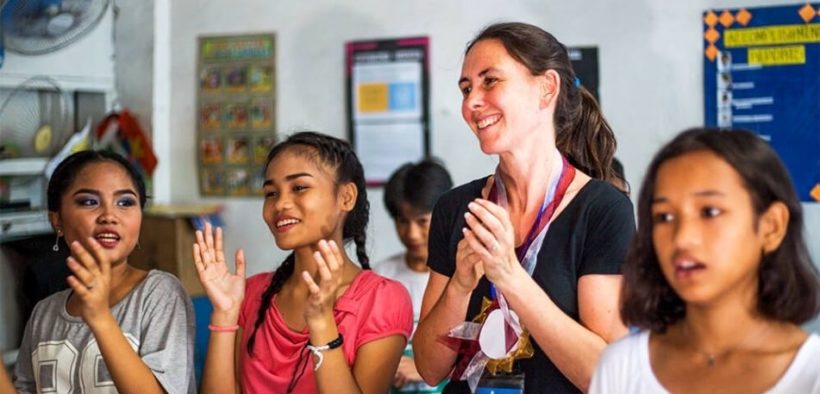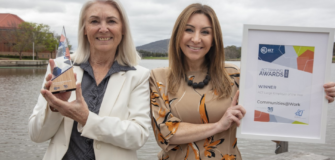This year has been a year of change even before COVID for Clare Steele. Last year she lived in Five Dock with her family, where her husband was a minister at the Anglican church.
She said she loved living in the inner west and had been part of the community of Five Dock for 10 years where she worked as the Chief Operating Officer of Anglican Deaconess Ministries and would cycle into work each day over the Anzac Bridge.
Fast forward a year, they are now living in Newcastle and she has somehow swapped roles with her husband where his main focus is at home and Clare’s main focus is her role at Compassion. She rides through the backstreets of Newcastle to get to work while exploring Newcastle, getting to know people and even no longer relying on google maps to get around!
In this interview, Clare talks to Third Sector about her life as a female CEO at Compassion, pushing boundaries, her motivation to keep going, and her belief of the importance of diversity as an enabler of solutions.
1. Can you share a time when pushing the boundaries didn’t seem worth it? How did you come out of that?
Clare: I found the years of having young children difficult; I shared about this time on The Inspiration Project podcast. It often felt that pushing boundaries was impossible and just getting through each day was a victory! Everyday felt like it contained the same tasks, of trying to get children to eat and sleep, or playing the same games and reading the same stories. For someone who loves achieving and completing tasks every day seemed to last a lifetime. During this time, I felt that who I was and who I wanted to be was lost in the role of being a mum. Looking back I can see that I grew greatly during this time, I grew in my relationship with God, I grew in understanding who I was, I grew in the ability to enjoy the present moment – though this is still a challenge – and I grew in patience.
2. You’ve had a diverse career in both for-profit and not for profit sectors, what do you think are the takeaways of both sectors that led you to succeed in your present venture?
Clare: One of the biggest takeaways for me personally has been the need to keep learning and reflecting. To be able to learn and reflect you need to approach all roles with a posture of humility and a desire to serve. This posture enables new ideas and new approaches to flourish and helps you individually grow and understand, expanding your own view of what is possible.
I shared with Brendan on the The Inspiration Project one of the keys to learning for me has been my love of reading. I always have three books on the go; a book related to the area I am working in or thinking about, a theology book and a good fiction book for reading before bed each night. But this might not be the best way for others to learn there is such a variety of resources that each person can find the approach that best suits them.
The other key takeaway is that you need to build the foundations of an organisation or a team, so that what is core to the mission and vision is completed with excellence. Solid foundations enable an organisation to try new things and take some bigger risks without impacting what is core to what the organisation does.
3. A lot of women look up to you for being one of the only females to take on a degree of mechatronics, how do you feel about that? What does it mean to encourage other women to utilise their gifts?
Clare: Studying Engineering seemed a very natural step for me because of my love for maths and science at school. For me the discipline of engineering aimed to solve problems with creative and beautiful solutions. This is what I love to do, solve problems. Encouraging women to utilise their gifts will bring diversity and different perspectives to complex problems like releasing children from poverty. Diversity will enable solutions that we had not thought possible and will bring greater creativity, innovation, elegance and beauty to our world. So I would encourage anyone, female or male, to pursue the areas you love and use your gifts to bring beauty, creativity and innovation to our world.
4. Finally, let’s talk about finding resources especially during this unprecedented time, can you tell us how you were still able to find funding for vulnerable children from the devastation of Covid-19? What motivates you to keep going?
Clare: This year we are extremely thankful for our supporters’ generosity in sharing their resources to support children in poverty. Many of our supporters have recognised that this is an extremely difficult time for children living in poverty and have not only continued to give but have increased the amount they give. Other supporters have not been able to give financially during this time, but have continued to support Compassion through prayer and sharing the increase in poverty that COVID is having.
For the first time in decades, global poverty is rising, and millions of children and families are at risk of sliding into poverty. There have been predictions that between 70-100 million more people will live in extreme poverty due to the impact of COVID. These numbers motivate me as do the stories that we receive from our 7000 partner churches around the world who are working with vulnerable children.
One of our church partners shared Alvin’s story. Quarantine measures hit hard for Alvin’s family as businesses closed across the country. This included the junk shop where his mother worked to earn a daily wage. Alvin was desperate to help—but he didn’t know what to do.
“I thought of looking for work or begging in the streets for money, but quarantine meant I couldn’t do either,” he says.
Just in time, the staff of his local Compassion centre arrived with a relief bag of rice, noodles, milk, vegetables, canned goods and other essentials.
“I don’t need to beg because I know God will supply for my family through the church and my sponsor,” says Alvin.
Being a small part of Alvin’s story motivates me to continue to strive to serve more children.
Pearl Dy is a community manager and journalist. She is passionate about business and development particularly involving not-for-profits, charity and social entrepreneurship.
























































































































































